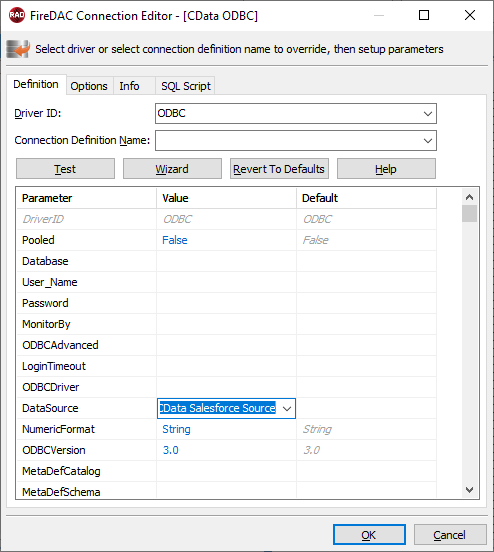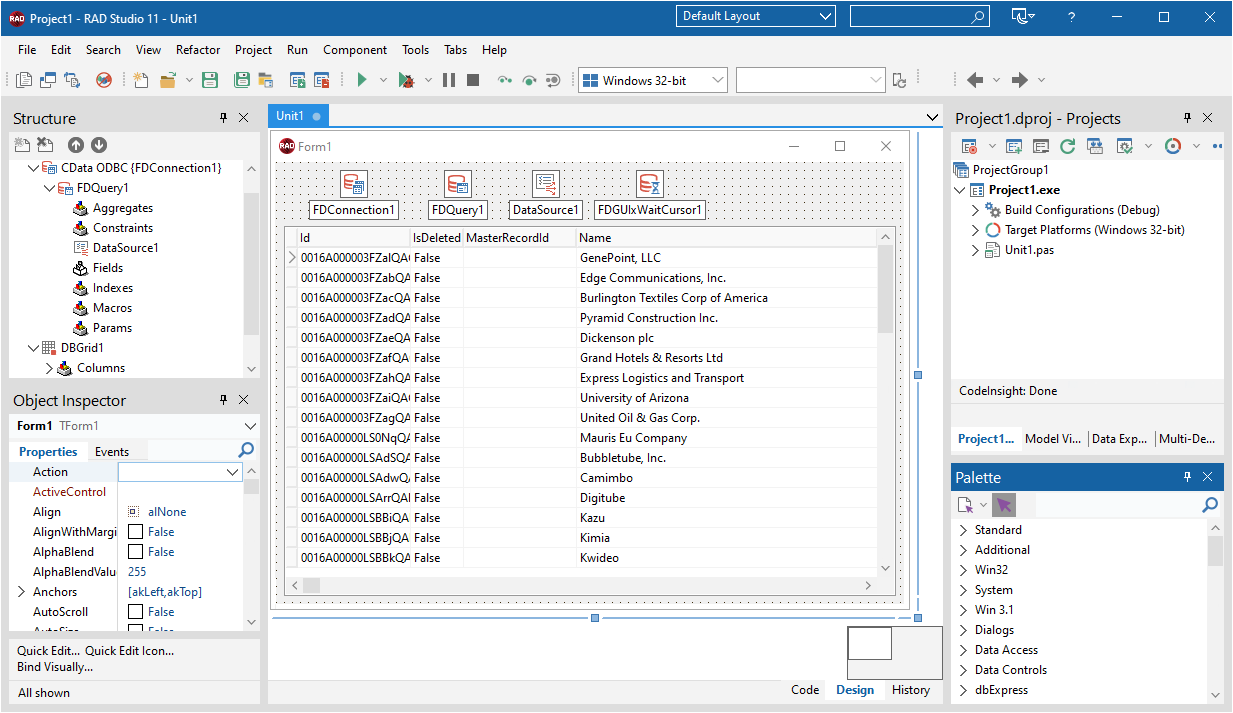Discover how a bimodal integration strategy can address the major data management challenges facing your organization today.
Get the Report →DataBind Controls to BigQuery Data in Delphi
DataBind to BigQuery data in Delphi with standard data access components and controls.
The CData ODBC driver for BigQuery supports the ODBC standard to enable integration of live BigQuery data with visual form designers and other rapid development tools in Delphi. The ODBC driver simplifies data access strategies for applications that share a single codebase like Delphi by providing a single API for database development. This article shows how to how to connect to BigQuery data and query data from a simple visual component library (VCL) application, as well as from Delphi code.
About BigQuery Data Integration
CData simplifies access and integration of live Google BigQuery data. Our customers leverage CData connectivity to:
- Simplify access to BigQuery with broad out-of-the-box support for authentication schemes, including OAuth, OAuth JWT, and GCP Instance.
- Enhance data workflows with Bi-directional data access between BigQuery and other applications.
- Perform key BigQuery actions like starting, retrieving, and canceling jobs; deleting tables; or insert job loads through SQL stored procedures.
Most CData customers are using Google BigQuery as their data warehouse and so use CData solutions to migrate business data from separate sources into BigQuery for comprehensive analytics. Other customers use our connectivity to analyze and report on their Google BigQuery data, with many customers using both solutions.
For more details on how CData enhances your Google BigQuery experience, check out our blog post: https://www.cdata.com/blog/what-is-bigquery
Getting Started
Create a Connection to BigQuery Data
If you have not already, first specify connection properties in an ODBC DSN (data source name). This is the last step of the driver installation. You can use the Microsoft ODBC Data Source Administrator to create and configure ODBC DSNs.
Google uses the OAuth authentication standard. To access Google APIs on behalf of individual users, you can use the embedded credentials or you can register your own OAuth app.
OAuth also enables you to use a service account to connect on behalf of users in a Google Apps domain. To authenticate with a service account, you will need to register an application to obtain the OAuth JWT values.
In addition to the OAuth values, you will need to specify the DatasetId and ProjectId. See the "Getting Started" chapter of the help documentation for a guide to using OAuth.
You can then follow the steps below to use the Data Explorer to create a FireDAC connection to BigQuery data.
- In a new VCL Forms application, expand the FireDAC node in the Data Explorer.
- Right-click the ODBC Data Source node in the Data Explorer.
- Click Add New Connection.
- Enter a name for the connection.
- In the FireDAC Connection Editor that appears, set the DataSource property to the name of the ODBC DSN for BigQuery.

Create VCL Applications with Connectivity to BigQuery Data
Follow the procedure below to start executing queries to BigQuery data from a simple VCL application that displays the results of a query in a grid.
-
Drop a TFDConnection component onto the form and set the following properties:
- ConnectionDefName: Select the FireDAC connection to BigQuery data.
- Connected: Select True from the menu and, in the dialog that appears, enter your credentials.
-
Drop a TFDQuery component onto the form and set the properties below:
- Connection: Set this property to the TFDConnection component, if this component is not already specified.
SQL: Click the button in the SQL property and enter a query. For example:
SELECT OrderName, Freight FROM Orders- Active: Set this property to true.
Drop a TDataSource component onto the form and set the following property:
- DataSet: In the menu for this property, select the name of the TFDQuery component.
-
Drop a TDBGrid control onto the form and set the following property:
- DataSource: Select the name of the TDataSource.
- Drop a TFDGUIxWaitCursor onto the form — this is required to avoid a run-time error.

Execute Commands to BigQuery with FireDAC Components
You can use the TFDConnection and TFQuery components to execute queries to BigQuery data. This section provides BigQuery data-specific examples of executing queries with the TFQuery component.
Connect to BigQuery Data
To connect to the data source, set the Connected property of the TFDConnection component to true. You can set the same properties from code:
FDConnection1.ConnectionDefName := 'mybigquery';
FDConnection1.Connected := true;
Create Parameterized Queries
Parameterized resources can improve performance: Preparing statements is costly in system resources and time. The connection must be active and open while a statement is prepared. By default, FireDAC prepares the query to avoid recompiling the same query over and over. To disable statement preparation, set ResourceOptions.DirectExecute to True; for example, when you need to execute a query only once.
Execute a Query
To execute a query that returns a result set, such as a select query, use the Open method. The Open method executes the query, returns the result set, and opens it. The Open method will return an error if the query does not produce a result set.
FDQuery1.Open('select * from Orders where ShipCity = :ShipCity',['New York']);
To execute a query that does not return a result set, such as a delete, use the ExecSQL method. The ExecSQL method will return an error if the query returns a result set. To retrieve the count of affected rows, use the TFD.RowsAffected property.
FDQuery1.ExecSQL('delete from Orders where Id= :myId',['x12345']);
i := FDQuery1.RowsAffected;
Related Articles
Below you can find other articles for using the CData ODBC Driver with RAD Studio, Delphi, and C++ Builder.





